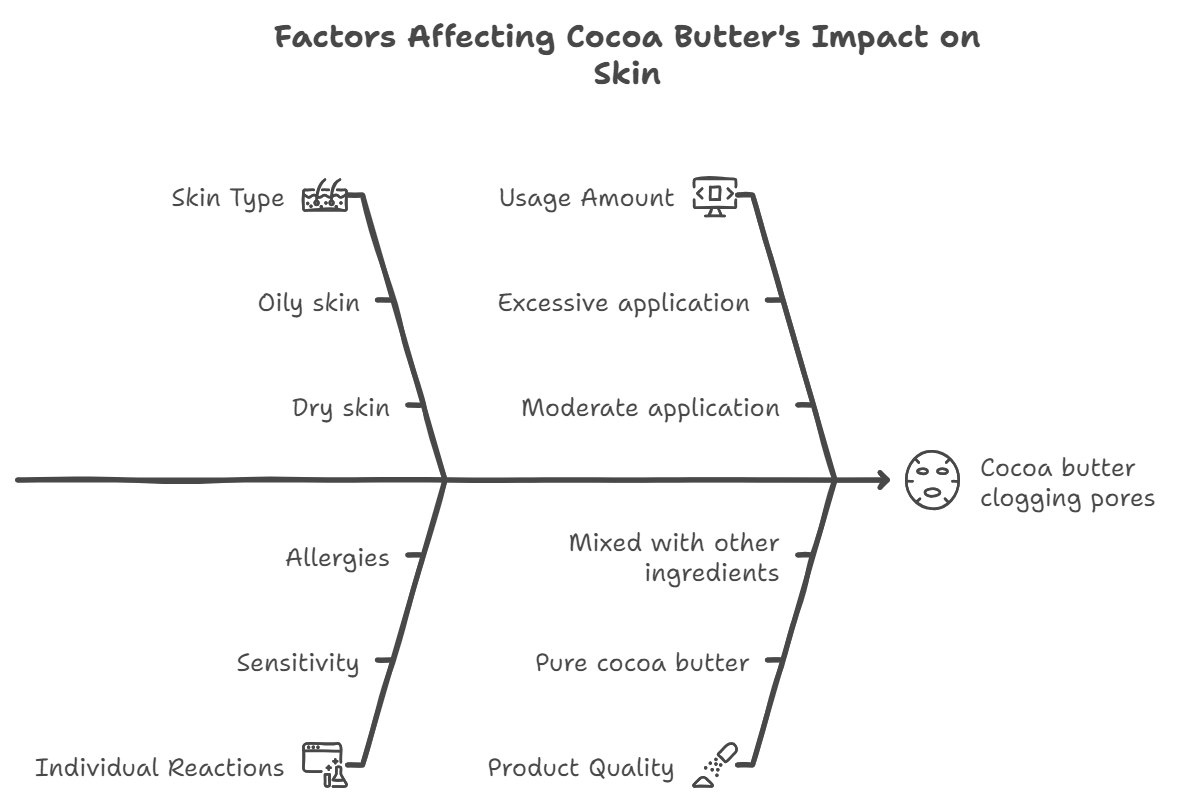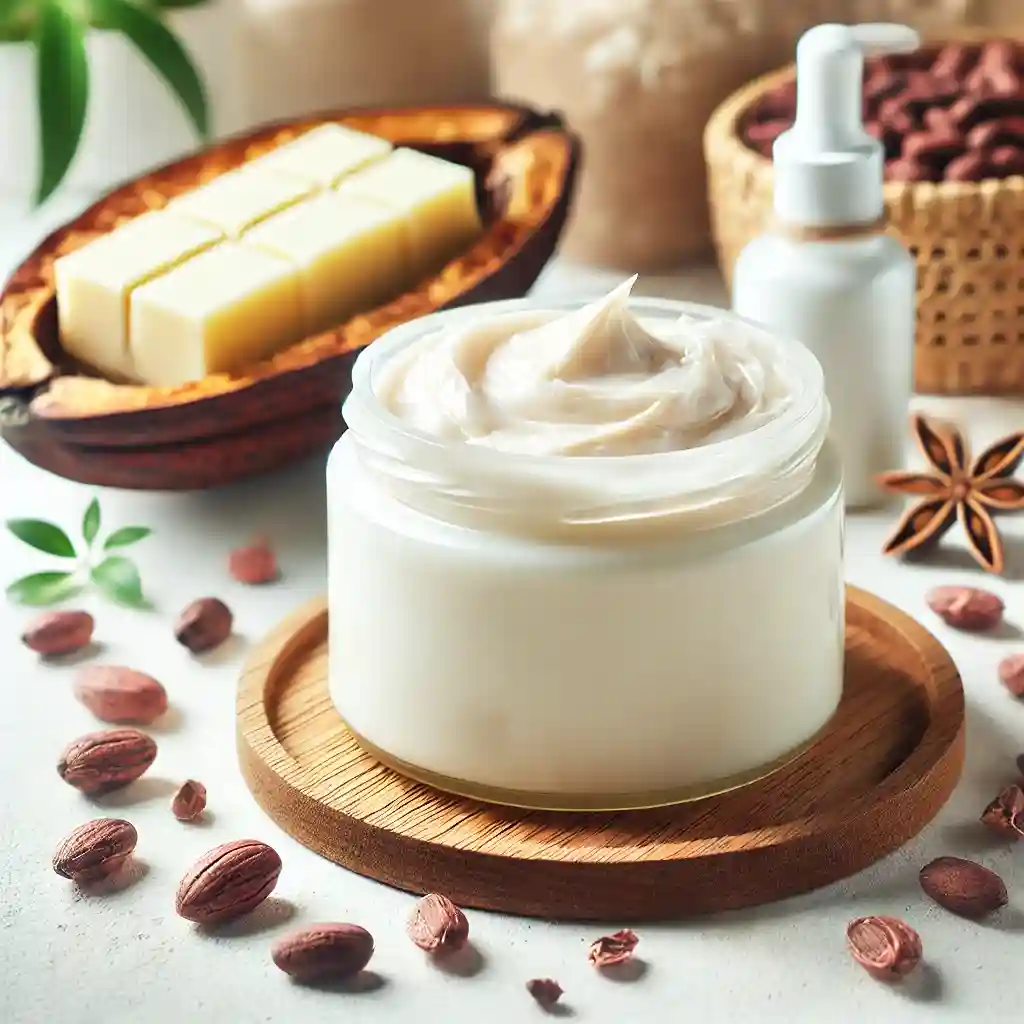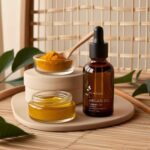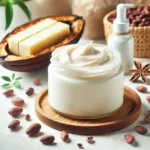
- Cocoa butter has a comedogenic rating of 4/5, making it likely to clog pores
-
Studies confirm that it increases the formation of microcomedones
-
Dermatologists recommend avoiding it on acne-prone or oily skin
Cocoa butter has long been a staple in many skincare routines, known for its rich moisturizing properties. But as with many skincare ingredients, questions have been raised about its potential drawbacks, particularly its tendency to clog pores and cause acne. We’ll delve deep into the research, dermatologists’ insights, and real user experiences to explore whether cocoa butter truly lives up to its reputation.
Click Here to View our Pore Clogging Ingredient Checker
What is Cocoa Butter, and Why is It Popular in Skincare?
Cocoa butter is a natural fat extracted from cocoa beans. It’s widely used in skincare products because of its high concentration of fatty acids, such as oleic acid, palmitic acid, and stearic acid, which help to hydrate and nourish the skin. Additionally, it contains antioxidants like vitamin E, which may help fight free radicals and reduce signs of aging. These qualities make cocoa butter a go-to ingredient for treating dry, flaky skin and improving skin elasticity.
However, despite these benefits, there’s growing concern about whether cocoa butter could be comedogenic—meaning, whether it has the potential to clog pores and cause breakouts. This concern arises from cocoa butter’s comedogenic rating, which stands at 4 out of 5. To understand why this rating is significant, let’s first dive into the science of comedogenicity.
Understanding Comedogenic Ratings: Why It Matters
Skincare ingredients are often rated on a comedogenic scale, ranging from 0 to 5, which helps gauge their potential to clog pores. A rating of 0 means the ingredient is non-comedogenic and unlikely to cause breakouts, while a rating of 5 indicates a very high likelihood of pore clogging.
Cocoa butter’s rating of 4 places it firmly in the “likely to clog pores” category, which raises red flags for those with oily, acne-prone, or sensitive skin. This high rating is based on how cocoa butter molecules interact with the skin: they are tightly packed, making it difficult for the skin to absorb the product fully without creating blockages in the pores.
The Research: Studies Confirm Cocoa Butter’s Comedogenicity
Several studies have evaluated the comedogenic potential of cocoa butter. One such study identified cocoa butter as a highly comedogenic ingredient. The researchers found that after just two weeks of using products containing cocoa butter, there was a noticeable increase in the formation of microcomedones—the precursors to blackheads and whiteheads.
Another study took a broader look at cosmetic ingredients and found that cocoa butter’s molecular structure tends to trap oil and debris in the pores, exacerbating acne in individuals with oily or acne-prone skin. This further explains why cocoa butter’s comedogenic rating is so high and why dermatologists often recommend avoiding it in facial skincare products for those prone to breakouts.
Dermatologists Weigh In: Why Experts Recommend Caution
When it comes to expert advice, dermatologists are generally in agreement about cocoa butter’s pore-clogging potential.
Dr. Michele Farber, a board-certified dermatologist at Schweiger Dermatology, cautions against using cocoa butter on acne-prone skin. She says, “Cocoa butter is known to clog pores. I advise my patients to be cautious before applying it to the face, especially if they are prone to acne or breakouts.”
Dr. Farber further advises people to avoid products where cocoa butter is listed among the first seven ingredients if they are concerned about acne.
Similarly, Dr. Alok Vij of the Cleveland Clinic echoes this concern, noting that
“Cocoa butter has a higher likelihood of causing comedones, or clogged pores, particularly in acne-prone skin.” He goes on to mention that while cocoa butter may be beneficial for severely dry skin, its use on the face, especially in people with oily or sensitive skin, should be limited.
This expert advice aligns with scientific research, which confirms that cocoa butter increases the formation of microcomedones. For people with acne-prone skin, this means using cocoa butter could result in more frequent breakouts and worsened skin conditions.
Real User Experiences: Praise vs. Caution
Beyond the lab and dermatology offices, everyday users have also shared their experiences with cocoa butter. Their stories offer a mixed bag of reactions, with some praising its deep moisturizing benefits and others lamenting the breakouts they experienced after using it.
Negative Experiences: A Word of Caution
A user on Reddit recounted their unfortunate experience with raw cocoa butter: “I have dry, sensitive skin and tried using raw unrefined cocoa butter on my face. Unfortunately, I quickly realized it’s very comedogenic. My skin broke out after just a few days, so I’d advise others to patch test before applying it to their entire face.”
Another user on the popular shaving forum, Badger & Blade, expressed hesitation about using cocoa butter in shaving soaps: “I did more research online, and indeed cocoa butter is listed as pretty comedogenic (pore-clogging). Now I’m hesitant to use it too often, as I’d rather avoid acne breakouts.”
These testimonials reflect the caution shared by dermatologists and researchers, emphasizing that while cocoa butter can hydrate the skin, its use may come at the cost of clogged pores and acne breakouts.
Positive Experiences: Cocoa Butter’s Moisturizing Power
That said, not everyone has had negative experiences with cocoa butter. For some users, its moisturizing properties far outweigh the potential downsides, especially for those with very dry skin.
A Reddit user with dry skin praised cocoa butter, writing: “My skin loves oils and occlusives, so cocoa butter suited me perfectly. For the first time in a long time, I woke up with my skin feeling hydrated, nourished, and bouncy without any dryness.”
This user acknowledged cocoa butter’s comedogenic rating but felt that its intense moisturizing properties outweighed the risks, suggesting that for certain skin types—particularly dry or mature skin—cocoa butter can be an effective solution for restoring hydration and improving skin texture.
Should You Use Cocoa Butter on Your Skin?
The question of whether or not to use cocoa butter comes down to your skin type and personal skincare needs. Given its high comedogenic rating, cocoa butter is not suitable for everyone. Let’s break down who might benefit from it and who should avoid it.
Who Should Avoid Cocoa Butter?
-
Acne-Prone Skin: If you are prone to acne or breakouts, cocoa butter’s comedogenic nature could worsen your condition. Dermatologists recommend avoiding it, especially on the face.
-
Oily Skin: Cocoa butter’s rich fatty acids may exacerbate oiliness, leading to more clogged pores and potential acne.
-
Sensitive Skin: Those with sensitive skin may find cocoa butter too heavy, potentially leading to irritation and clogged pores.
Who Might Benefit from Cocoa Butter?
-
Dry, Flaky Skin: If you have extremely dry skin that doesn’t tend to break out, cocoa butter’s occlusive properties can help lock in moisture and restore hydration.
-
Mature Skin: The rich antioxidants in cocoa butter may help combat free radicals and improve skin elasticity, making it a good option for aging skin that lacks moisture.
-
Body Care: While cocoa butter may not be ideal for facial skincare, it can be a fantastic option for the body, particularly on dry areas like elbows, knees, and feet.
In any case, if you decide to try cocoa butter, be sure to perform a patch test first, particularly if you’re planning to use it on your face. This will help you gauge whether the ingredient is compatible with your skin before applying it to a larger area.
Conclusion: A Double-Edged Sword for Skincare
Cocoa butter is undoubtedly a powerful moisturizer, loaded with fatty acids and antioxidants that can deeply nourish the skin. However, it’s also a highly comedogenic ingredient, meaning it’s likely to clog pores and cause breakouts in acne-prone or oily skin.
Whether or not you should incorporate cocoa butter into your skincare routine depends largely on your individual skin type and concerns. For those with very dry skin, cocoa butter can provide much-needed hydration. But for those with acne-prone or oily skin, it’s best to exercise caution and consider other, less comedogenic moisturizing options.
Ultimately, understanding your skin and its unique needs is the key to making the right decision about cocoa butter—and any other skincare ingredient.

I’m a devoted organic skincare enthusiast, passionate about the natural, wholesome goodness that organic products bring to our skin.
Organic skincare isn’t just a hobby for me—it’s a lifestyle. Every product I use, recommend, and write about has been carefully chosen for its purity and effectiveness. Everything I write about is backed by scientific studies, dermatologists’ opinions, and user experiences.
I also excel at tackling skincare challenges with innovative, organic solutions.


